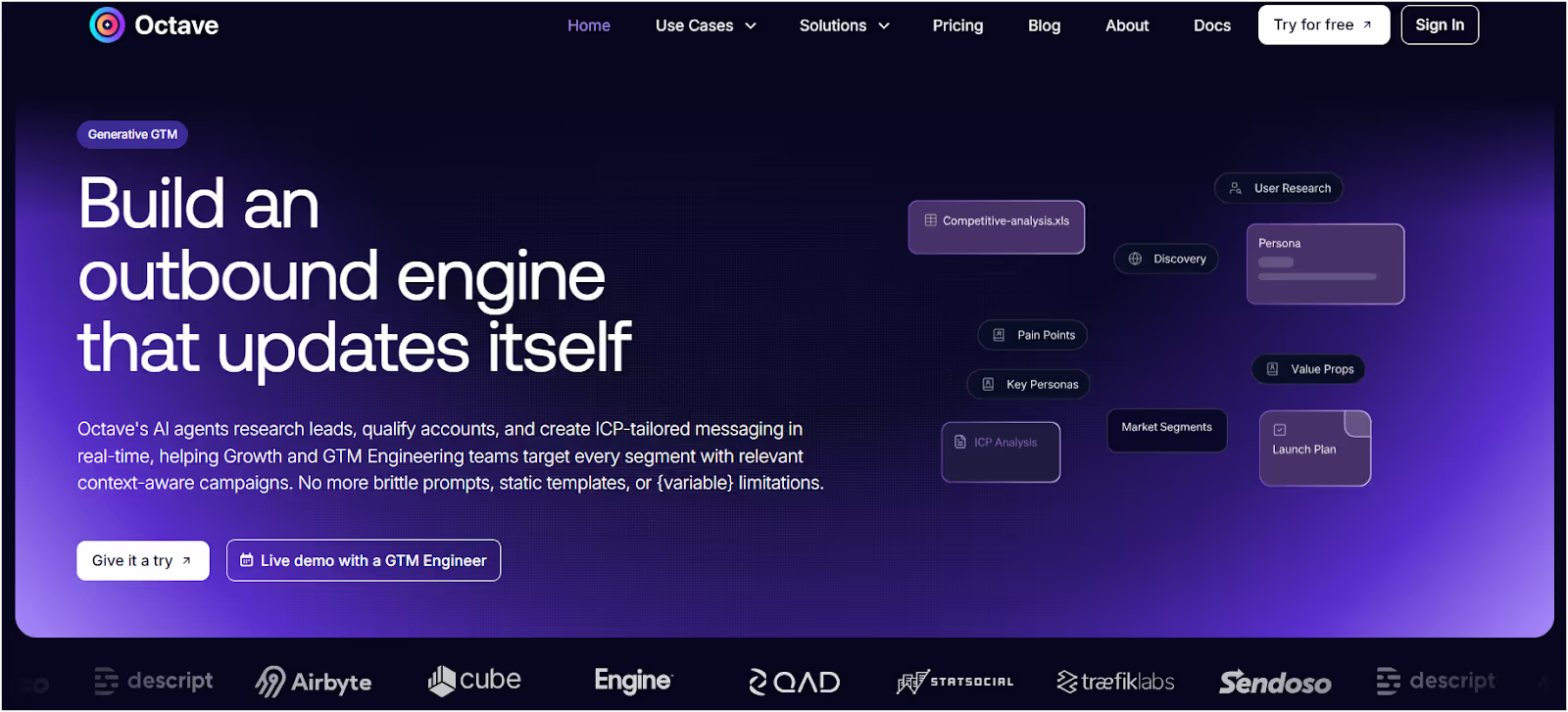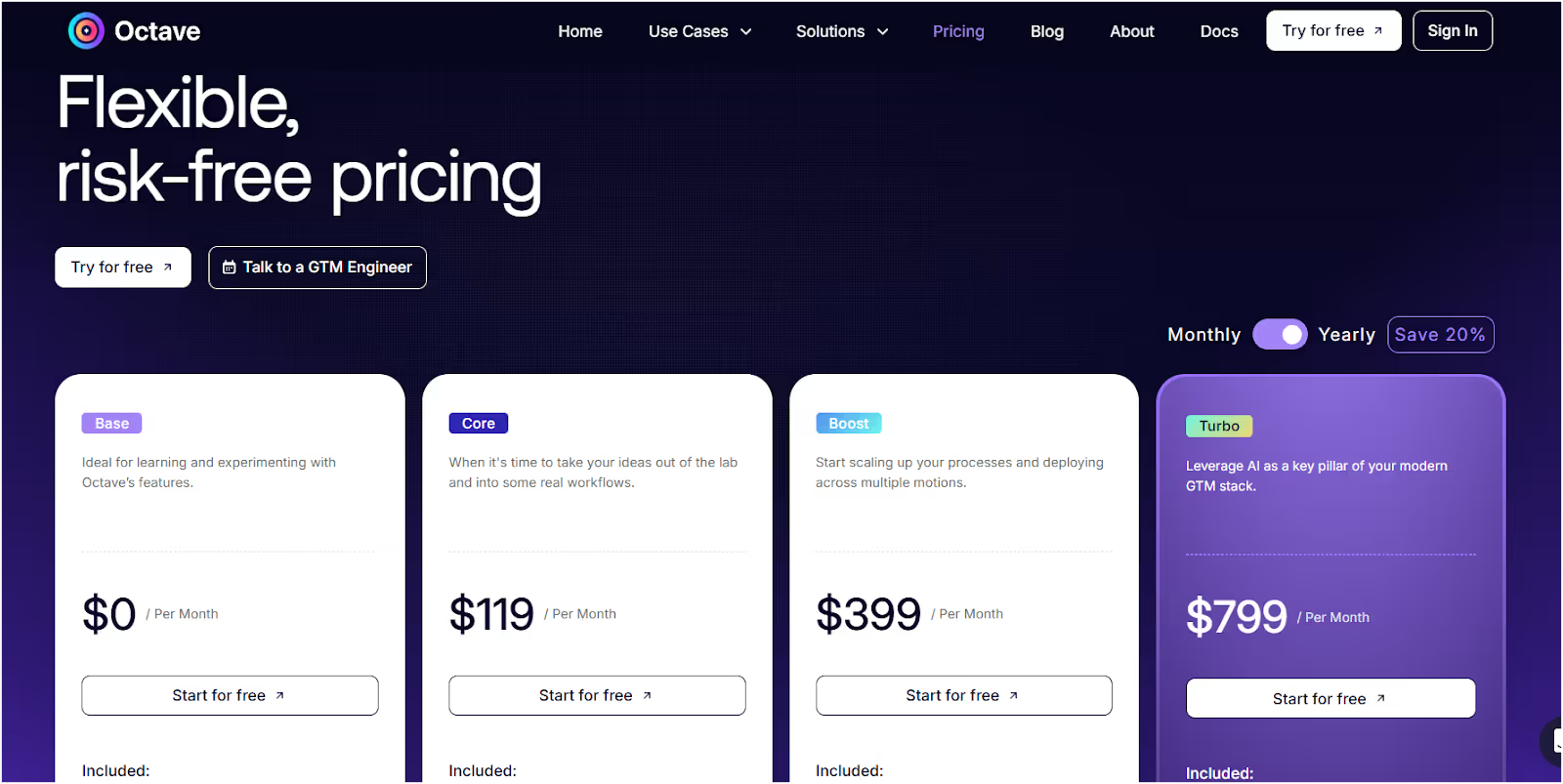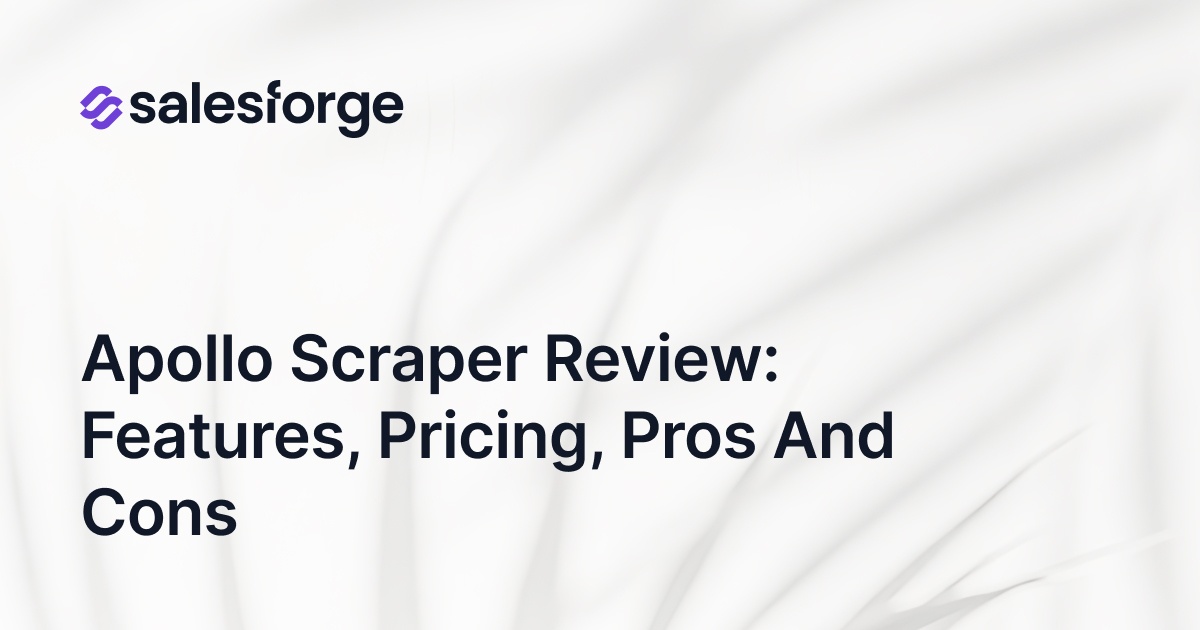Octave HQ Pricing & Review: Is It Worth the Cost for SMBs?
If you run a small or mid-sized business, every dollar counts.
The wrong tool won’t just waste money, it will waste time, pipeline, and growth.
That’s why most founders and sales leaders keep asking the same question: Is Octave HQ worth the price?
Octave HQ promises to build GTM playbooks, write outbound messaging, and cut down manual work with AI agents.
But here’s the problem: Octave HQ pricing starts at $119/month and jumps quickly to $399, $799, and beyond.
For SMBs running lean, those numbers can break the budget fast.
This article will give you the full picture:
- A clear breakdown of Octave HQ pricing plans
- What each tier actually gives you (and where limits show up)
- Real user reviews: the good, the bad, and the hidden trade-offs
- A side-by-side look at Octave HQ vs an alternative to see which one gives better value for SMBs
By the end, you’ll know if Octave HQ is a smart investment, or if you’re better off with a more affordable alternative that gets you the same (or better) results.
What is Octave HQ?

Octave HQ is a generative GTM platform.
In simple words, it’s software that helps you build sales playbooks, write outbound messaging, and run go-to-market workflows using AI agents.
Instead of hiring a team to do all the research, persona mapping, and copywriting, Octave HQ promises to cut that time down to minutes.
It’s mainly built for RevOps leaders, sales teams, and GTM managers who want to automate strategy and execution.
The tool takes customer data, market insights, and product info, then turns it into playbooks or campaigns your team can use right away.
For SMBs, the appeal is obvious: less manual work, faster execution, and the chance to look “enterprise-level” without hiring an enterprise-sized team.
But the real question is whether the pricing matches the value, especially when budgets are tight and ROI has to be clear.
Octave HQ Pricing Plans (2025)

Octave HQ pricing is split into five plans: Base, Core, Boost, Turbo, and Ultra.
Prices start at $149/month on monthly billing and go as high as $999/month.
If you pay yearly, you save 20%, but the entry plan is still more expensive than most SMB-focused sales tools.
Here’s what each plan includes:
- Base Plan ($0/month) – Free forever, but very limited. Good for testing only.
- Core Plan ($149/month | $119/month on yearly billing) – For small teams starting out. Includes 4,000 credits, 24 agents, and email/chat support.
- Boost Plan ($499/month | $399/month on yearly billing) – The most popular option. Designed for teams that need to scale. 20,000 credits, 48 agents, and 12 playbooks.
- Turbo Plan ($999/month | $799/month on yearly billing) – For larger sales orgs that want Octave HQ as a core GTM engine. Unlimited agents, 60,000 credits, Slack support.
- Ultra Plan (Custom Pricing) – Enterprise-only. Includes advanced agents, enterprise APIs, premium integrations, and GTM engineering support.
Octave HQ Pricing Comparison Table
What This Means for SMBs
- The Core plan is the real entry point ($149/month). Free isn’t usable for production.
- Costs rise sharply. Going from Core to Turbo jumps from $149 → $999 per month.
- Octave HQ is credit-based, so scaling usually forces upgrades faster than you expect.
- Yearly billing cuts costs by 20%, but even then, you’re looking at $1,428/year for Core or $9,588/year for Turbo.
For SMBs, this is the make-or-break factor. Octave HQ delivers value, but the pricing curve is steep.
Unless you’re well-funded, the cost-to-return ratio can feel risky compared to learner tools
Octave HQ Features & Limits by Plan
Octave HQ pricing isn’t just about dollars.
What you actually get depends on the limits in each plan—and that’s where SMBs often run into problems.
Here’s how the features break down:
- Workspaces – Even the free plan gives you some. Paid plans unlock unlimited workspaces.
- Offerings & Playbooks – Entry plans cap how many playbooks you can run. Boost and Turbo give you more, but you’re paying for the jump.
- Agents – Agents are Octave’s AI workers. Core gives you 24, Boost 48, Turbo unlimited. SMBs trying to scale quickly find Core feels tight.
- Credits – This is the real bottleneck. Core comes with 4,000 credits, Boost 20,000, and Turbo 60,000. Once you run out, you either buy more or upgrade.
- Support – Free plan = community only. Core/Boost = email + chat. Turbo adds Slack. Ultra gives you GTM engineers (enterprise only).
Where SMBs Hit Walls
- Credits run out fast. If you’re testing multiple playbooks or running campaigns at scale, Core’s 4,000 credits won’t last long.
- Scaling requires expensive jumps. The moment you outgrow Core, you’re looking at a $499 Boost plan. That’s a 3x jump in cost just to get more credits and agents.
- Support tiers are paywalled. To get premium support (Slack access), you’re paying $999/month. SMBs usually don’t get this level unless they’re on Turbo or Ultra.
Bottom Line on Features
Octave HQ offers solid GTM features, but the limits force you into higher plans faster than most SMBs expect.
For large enterprises, the scaling makes sense. For lean teams, it’s easy to feel trapped by the credit system and rising costs.
Is Octave HQ Worth It for SMBs?
At first glance, Octave HQ looks like the perfect solution for small and mid-sized businesses.
It promises faster GTM execution, less manual work, and a team of AI agents working behind the scenes.
But when you dig into the numbers, the real question is: does the value match the price for SMBs?
Pros of Octave HQ for SMBs
- AI-driven GTM workflows – Playbooks, outbound messaging, and persona-based campaigns built in minutes.
- Time savings – Cuts down hours of research, targeting, and campaign setup.
- Premium support (at higher tiers) – Turbo and Ultra plans come with Slack and GTM engineer access.
Cons of Octave HQ for SMBs
- Expensive scaling – The Core plan starts at $149/month, but moving up to Boost is $499/month. That’s a steep jump.
- Overpaying for unused features – Many SMBs don’t need 48+ agents or 20,000+ credits, but still have to upgrade.
- Credit dependency – Run out of credits? Either buy more or upgrade. This forces SMBs into higher tiers quickly.
Verdict: Who Should Use Octave HQ?
- If you’re a well-funded scale-up with a dedicated GTM team, Octave HQ can be worth the cost.
- If you’re a bootstrapped SMB or early-stage founder, the pricing curve makes it risky. You’ll likely spend more than you get back, especially in the early days.
For most SMBs, the better move is to start with a tool that keeps costs predictable, scales without credit traps, and focuses on deliverability and pipeline growth.
That’s where alternatives like Salesforge come in.
Octave HQ vs Salesforge: Which Fits SMBs Better?
When you stack Octave HQ against Salesforge, the biggest difference is obvious: pricing and scalability.
- Octave HQ starts at $149/month (Core) and scales to $999/month (Turbo). It’s built for GTM playbooks, strategy, and AI-driven execution.
- Salesforge starts at just $40/month and gives you unlimited warmup, inbox rotation, personalization, and deliverability tools right away—without the “credit trap” model.
Use Cases
- Octave HQ → Better if you’re building GTM playbooks and need strategy baked into your sales motion.
- Salesforge → Better if you care about cold outreach, inbox placement, and scaling campaigns affordably.
Value for SMBs
Salesforge simply gives SMBs more sending power with multichannel outreach, complete automation, and inbox deliverability at a fraction of Octave’s cost.
You don’t get stuck upgrading just because credits ran out.
Octave HQ vs Salesforge Comparison Table
Bottom Line
- If you’re an SMB, Salesforge is the safer bet: lower cost, predictable pricing, and immediate ROI on outreach.
- If you’re an enterprise GTM team with budget to spare, Octave HQ might fit your playbook strategy.
Who Should Choose Octave HQ vs Salesforge?
Final Verdict: Is Octave HQ Worth the Cost?
Octave HQ is a powerful platform, no doubt. It builds GTM playbooks, automates messaging, and helps big teams move faster.
But when you look at the numbers, the reality is clear:
- Pricing starts at $149/month and climbs to $999/month (or custom enterprise).
- Credits run out fast, pushing SMBs into higher tiers.
- Reviews show strong results, but mostly from well-funded scale-ups that can absorb the cost.
For enterprises, Octave HQ makes sense. It’s built for RevOps teams with budget, headcount, and a need for heavy GTM automation.
For SMBs, the story is different.
The credit model, steep pricing jumps, and paywalled support make it a risky investment when every dollar has to generate pipeline.
If you want predictable pricing, inbox placement that works, and outreach that actually scales, start with Salesforge. At $40/month, you get warmup, deliverability, and automation—without worrying about running out of credits.
👉 The smart play: let Octave HQ handle strategy if you’re big enough, but if you’re a lean SMB, test Salesforge first.
It keeps your costs low while giving you the firepower to grow.

.png)
.png)


